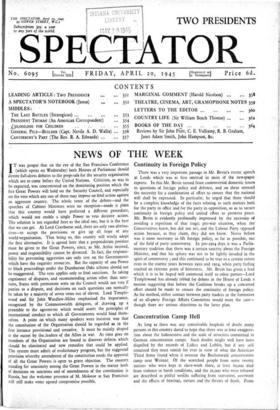Continuity in Foreign Policy There was a very important passage
in Mr. Bevin's recent speech at Leeds which was at first omitted in most of the newspaper reports. In this Mr. Bevin turned from controversial domestic issues to questions of foreign policy and defence, and on these stressed the necessity for a combination of effort to ensure that the national will shall be expressed. In particular, he urged that there should be a complete knowledge of the facts relating to such matters both for the party in office and for the party in opposition, so as to secure continuity in foreign policy and united effort to preserve peace. Mr. Bevin is evidently profoundly impressed by the necessity of avoiding a repetition of that tragic pre-war situation, when the Conservatives knew, but did not act, and the Labour Party opposed action because, as they claim, they did not know. Never before was it more necessary to lift foreign policy, as far as possible, out of the field of party controversy. In pre-1914 days it was a Parlia- mentary tradition that there was a certain sanctity about the Foreign Minister, and that his sphere was not to be lightly invaded in the spirit of controversy ; and this continued to be true to a certain extent even in the stormy years between 19to and 1914, when party feeling reached an extreme point of bitterness. Mr. Bevin has given a lead which it is to be hoped will commend itself to other parties—Lord Templewood has already tabled for debate in the House of Lords a motion suggesting that before the Coalition breaks up a concerted effort should be made to ensure the continuity of foreign policy. As for method, either contact between party leaders or the formation of an all-party Foreign Affairs Committee would meet the case— though there are serious objections to the latter plan.


























